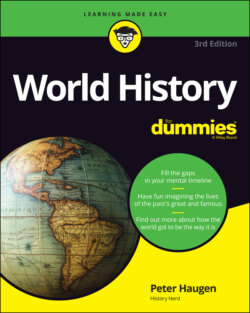Читать книгу World History For Dummies - Peter Haugen - Страница 61
PERILS OF POWER
ОглавлениеFrom the time Egypt became one nation, its increasingly powerful, ever-richer ruler also underwent a transformation. More than a man, the pharaoh was a living god.
Being a god wasn’t as great as it sounds, though — at least, not at first. Early kings of unified Egypt had to prove themselves fit to stay on top. A king who failed a rigorous annual physical challenge was considered no longer able to provide for the state and so was killed by priests in ritual sacrifice. Understandably, considering who made the rules, this practice disappeared by about 2650 BC.
Babylon emerged as the center of a new empire in the late seventh century BC, after the Chaldeans — a Semitic people related to Arabs and Jews — moved into the ancient city and conquered lands stretching to the Mediterranean. This territory was the empire ruled by Nebuchadnezzar II (605–562 BC), whose conquest of Jerusalem you can find in Chapter 20. The empire of Babylonia fell in the Persian conquest of 539–538 BC, but the city of Babylon remained an urban center for more than 200 years. (Alexander the Great died there in 323 BC.)
